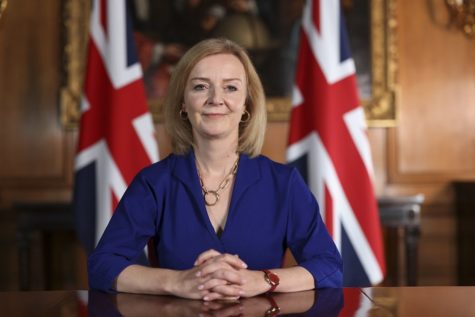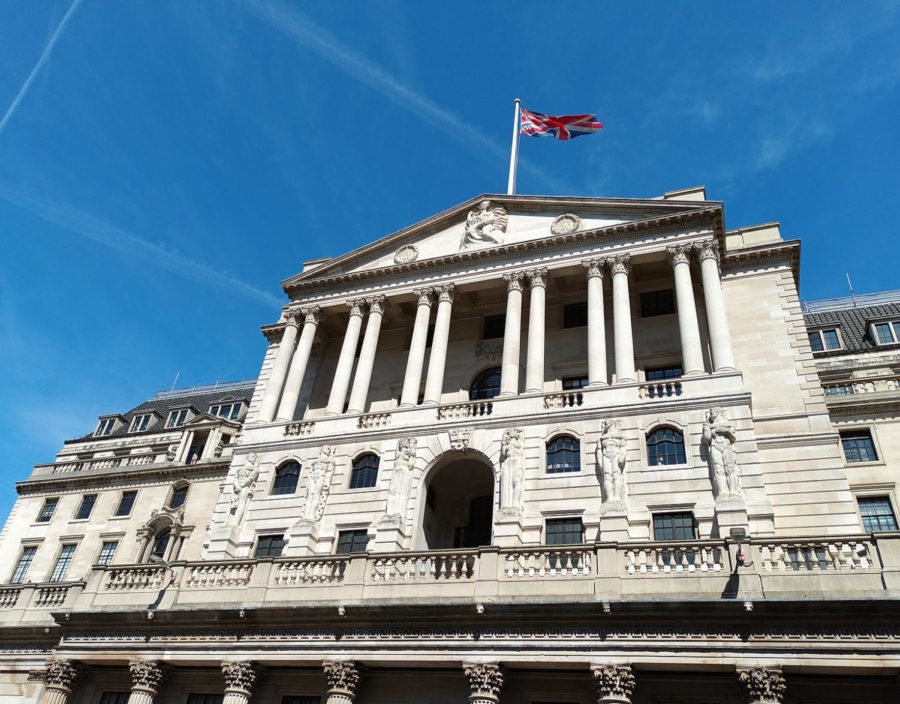The United Kingdom’s Crisis in Competency
While Britain struggles to cope with mounting crises, irresponsible government action has put the nation in an indefinite state of chaos that could ultimately bear disastrous consequences.
acediscovery, CC BY 4.0
The Bank of England, pictured here, has been forced to intervene in the markets due to the UK’s deepening economic crisis, which has continued to devastate the nation.
An economic crisis. Political upheaval. Record-high inflation. A cost of living catastrophe. Yet, the United Kingdom, and crucially its own political leaders, have failed to realize that their actions can produce devastating consequences.
When Liz Truss took over as U.K. Prime Minister, she vowed to follow through on her agenda and cut taxes amidst growing economic struggles. Yet, after only six weeks in charge, Truss resigned, ending what many have regarded as a disastrous reign.
Truss’s 49-day tenure – the shortest in British history – was wrought with controversy. She avoided the spotlight in her early days as the nation mourned the loss of its seventy-year monarch, but her cover didn’t last.
On September 23rd, 2022, financial chancellor Kwasi Kwarteng, a long-time Truss ally, announced a “mini-budget,” immediately sending the markets into turmoil. The budget included £45 billion in unfunded tax cuts for the wealthiest Brits, abolishing the 45% tax bracket for those earning over £150,000 annually. It also planned to slash corporate tax rates from 25% to 19% while increasing the cost of national insurance.
Following the announcement of the mini-budget, the markets responded poorly. The British pound fell to its lowest-ever rate against the U.S. dollar, nearly hitting parity. Investors sold off many of their U.K.-backed assets as bond prices fell to a 20-year low. Amidst the chaos, the Bank of England intervened, announcing another hike in interest rates and an expansion of its emergency bond-buying operation to restore stability in the market.
“The U.K. is trying to buy bonds so interest rates don’t go higher,” said Mr. Joshua Fialkow, an economics teacher at Bronx Science. “Yet, it seems to be backfiring. Increased bond prices usually mean that interest rates go down, but rates are soaring. As a result, there seems to be a crisis of faith in Britain’s economic potency.”
Truss’s plan emerged during the Conservative Party leadership election this past summer, which boasted a field of eleven candidates. Truss, who was the foreign secretary in Boris Johnson’s cabinet, won the vote and became the party leader, solidifying her status as Prime Minister.
Throughout the leadership campaign, Truss’s opponent, former financial chancellor Rishi Sunak, lambasted her plan as “fairytale” economics. Sunak warned that Truss would single-handedly torpedo Britain’s economy, causing huge spikes in both inflation and interest rates. In response, Truss doubled down on her economic manifesto, pledging that her plans would catalyze job growth and expand economic opportunities for British citizens.

(Simon Dawson / No10 Downing StreetPosted by: Foreign, Commonwealth & Development Office and The Rt Hon Elizabeth Truss MP, OGL 3 <http://www.nationalarchives.gov.uk/doc/open-government-licence/version/3>, via Wikimedia Commons)
Eventually, Sunak’s foresight was proven correct. While Truss initially stood firm, she soon changed her mind, eliminating crucial elements of her original budget. In doing so, Truss announced that the 45% tax bracket would remain, while reversing the plan to lower the corporate tax rate. Truss also fired Kwarteng, who she blamed for the economic debacle. The decision left the two on bad terms, with Kwarteng angered by taking the fall for Truss’s failed plans.
The plan, which many have called “Trussonomics,” is directly inspired by President Ronald Reagan’s past neoliberal economic policies. “Reaganomics” sought to reduce taxes for the wealthy, deregulate industry, and lower government spending, all things Truss attempted to implement.
The success of “Reaganomics” is still debated. Many argue that it helped to end stagflation and to promote stronger growth in the United States throughout the 1980s. However, others point to significant increases in the wealth gap and a tripling of the deficit over Reagan’s eight years in office to prove that “Reaganomics” was an astounding failure.
Later Presidents have followed Reagan’s strategy, most notably Donald Trump. Trump’s 2017 tax cuts permanently slashed the corporate tax rate from 35% to 21% and decreased individual rates for the wealthiest Americans, leading to massive increases in the deficit that still linger to this day.
Yet, unlike the mixed criticism of America’s supply-side plans, “Trussonomics” was universally panned. Critics pointed to data from the S&P Global Index, which indicate that the U.K. is already in the midst of a four-quarter (year-long) recession. The economic crisis has imposed massive burdens on the British public, with many households now unable to cope with increased inflation, costs, and energy prices.
The energy crisis has dealt an especially catastrophic blow to the British public. Truss reiterated that her mini-budget would reduce the financial burden of families dealing with the crisis, which has primarily resulted from a combination of inflation and limited supply due to the war in Ukraine. Her government introduced a freeze on all energy bill payments until the end of the winter, saving households and businesses an average of £2,500. While the government initially intended the freeze to last beyond the winter, worries in the investment market led Truss to legislate on a shortened time frame.
Even with the price freeze, the public will continue to grapple with a limited energy supply. The U.K. and most other European nations have consistently relied on Russian oil and gas to power their homes, factories, and facilities. Yet, the U.K.’s aggressive sanctions against Russia prompted Putin to shut down the Nord Stream pipeline, effectively severing the gas supply to the remainder of Europe.
Beyond Truss’s missteps, her plan lacked the funding necessary to maintain economic stability. The opposition Labour Party advocated for a windfall tax, a one-off tax imposed by the government on a given company. Sunak introduced the measure as financial chancellor in hopes of alleviating the crisis resulting from the pandemic. If implemented, the tax would primarily target energy companies, applying to profits from extracting U.K. oil and gas.
However, Truss refused to support any measures to help the government pay for the tax package. As a result, conservative MPs began to call for a motion of no confidence, believing the Prime Minister was unfit to serve as party leader. Eventually, those calls turned into demands for resignation, putting Truss in the direct line of fire. She adamantly defended herself during weekly Prime Minister’s Questions, receiving massive rebuke from Labour and other opposition parties. Truss resisted calls for her resignation, declaring she was “a fighter, not a quitter.” Yet, only a day later, Truss announced that she could not deliver on the mandate provided to her by the Conservative Party and announced her resignation.
Truss’s resignation has left the U.K. in a profound political crisis. Labour Party leader Keir Starmer immediately called for a snap general election, stating there must be an end to what he described as a “revolving door of chaos.” Since David Cameron delivered a coalition government with the center-left Liberal Democrats in 2010, Conservative leadership has proven unstable. Cameron won the party a majority in the 2015 election but resigned a year later following the U.K.’s catastrophic Brexit vote.
Since Cameron’s resignation, four different prime ministers have taken charge. Theresa May, Cameron’s successor, called a snap election in hopes of increasing her majority and gaining leverage in Brexit negotiations. However, May’s decision ended in disaster, with the Conservatives losing their majority in parliament. May was eventually replaced by Boris Johnson, who delivered the party a massive majority in yet another election.
Johnson campaigned on finalizing Brexit and strengthening Britain’s economy, but later faced mass criticism for his COVID-19 response. During lockdown, Johnson held parties for his staff and colleagues, breaking the strict rules that his government implemented for the public. After a report corroborated this scandal, later known as “partygate,” Johnson faced immense scrutiny and was forced to resign in disgrace. Johnson’s resignation engendered the leadership contest that Truss won, setting off her short, chaotic reign as Prime Minister.
Truss’s decision triggered yet another Conservative leadership contest. While Johnson immediately vowed to campaign for his old job only seven weeks after stepping down, he ultimately decided against it after receiving limited support from fellow MPs. As a result, Sunak entered the race, winning uncontested. He took office a day later, becoming Britain’s first Asian, non-white Prime Minister.
Sunak faces an arduous task; he must restore stability by entirely reversing Truss’s mini-budget, combat the cost of living crisis, and navigate Britain’s ever-changing relationship with the European Union, all of which will have massive impacts on the British economy in the long term.

(Simon Walker / HM Treasury, OGL 3 <http://www.nationalarchives.gov.uk/doc/open-government-licence/version/3>, via Wikimedia Commons)
Sunak doesn’t have an extended honeymoon period, however. He has approximately 18 months to deliver on his promises before having to call a general election. Polls suggest Sunak’s party would get trounced at the election, with Labour projected to win an overwhelming majority of parliamentary seats. While the British public overwhelmingly wants a vote, Sunak has resisted calls for an election, believing that he would inevitably lose, leading to the end of more than a decade of Conservative rule.
While Sunak remains steadfast in his confidence, the British people demand answers. Between financial hardship, increased cost of living, and energy shortages, the public has become disgruntled with the government’s insufficient response to the economic crisis at hand. All of the weight falls on Sunak’s shoulders, as he must execute a robust recovery while remaining dedicated to Britain’s many other concerns, such as climate change, amending the Northern Ireland Protocol, and Scotland’s demand for a second independence referendum.
As the United Kingdom continues to endure its struggles, the country is at an inflection point. People are struggling to afford general goods and services, the economy is near collapse, and the government remains unstable and unpopular. Now more than ever, the U.K. must overcome its crisis of competence or face a potential wave of disaster looming ahead.
While Sunak remains steadfast in his confidence, the British people demand answers. Between financial hardship, increased cost of living, and energy shortages, the public has become disgruntled with the government’s insufficient response to the economic crisis at hand.
Ethan Weinberg is an Editor-in-Chief for 'The Science Survey.” Ethan enjoys journalistic writing, as he believes that by making sense of the issues on...

